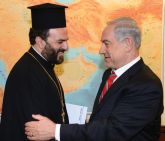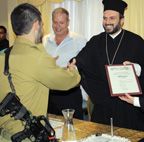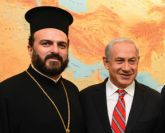×


We have detected your country as:
Please click here to go to the USA website or select another country from the dropdown list.
by: Brian Schrauger

Photo credit: Moshe Milner/GPO
There is a priest in Nazareth standing for the Jewish state of Israel. Locals there have not yet thrown him off a nearby cliff, but many would like to do so.
Reviled and despised by childhood friends, Arab politicians and Christian Palestinian leaders, Father Gabriel Naddaf, a Greek Orthodox priest, has received more death threats than he can count. Why? Naddaf insists that Israel’s Christian citizens should be patriotic Israelis, fully participating in its democracy, serving in its military, celebrating and embracing the freedom it affords to Christians. This conviction, he insists, is not about politics; it is about the Bible. It is what the Bible says about citizenship in any nation. And in Israel, it is what the Bible says about God’s irrevocable promises to the Jewish people as His caretakers of the Holy Land; their leadership of His nation, Israel; and their generous inclusion of non-Jews living in the Land, granting them protection and undiminished rights as citizens-in-full.
During a recent visit to his office in Nazareth, Naddaf told me his story, sharing his passion and his vision for the future.
Naddaf, 42, has been a priest for twenty years. Tall, handsome and with sparkling, intelligent eyes, he decided to become a priest contrary to his parents’ wishes. “They said I was too good-looking to be a priest,” he says, grinning. “My mother wanted me to be a lawyer or a doctor. But for some reason, I knew that God wanted me to become a priest.”
Disowned by his family at age 18, Naddaf moved in with his grandmother. “She was wonderful,” he says. “She did not understand my decision, but she supported and encouraged me. Thanks to her, I did what God wanted me to do.”
After ordination, and serving as a priest for several years, his parents saw God’s hand and their son’s joy in the path he had pursued. “Today they are my greatest supporters,” he says, smiling with affection.
Standing alone, doing what Naddaf knew was right in spite of family rejection, was both preparation for and an indication of the lifelong path to which he was called and follows to this day.

Christian Arab soldier, Monaliza (Photo credit: IDFblog.com)
Two years ago, the spotlight of public attention turned its focus on this priest from Nazareth when he began to publicly encourage non-Jewish citizens of Israel to serve in Israel’s Defense Forces—the IDF.
“My oldest son was approaching the age when, according to Israeli law, Jewish male citizens are supposed to serve three years in the IDF. Non-Jews are allowed to serve but not required to do so.”
For Naddaf, however, the teachings of the Bible make it clear: Christians are called to be loyal citizens of the state in which God has placed them, and all the more so when that state protects its Christian citizens and provides them freedom. Israel, Naddaf says, is remarkable in this regard. “Among all the nations in the Middle East, Israel is the only one where the Christian population has grown. Everywhere else it has shrunk—including Bethlehem! It is the only country in which Christians are not persecuted by the state for practicing their faith. It is the only Middle East nation where Christians have full access to education, business opportunities and political participation.”
“In a day when Christians throughout the Middle East are being beheaded for their faith, Christians in Israel are free to practice their faith, free to pursue any career, free to travel where they want, marry the one they love, to pursue whatever kind of work that they desire. Should we not celebrate this remarkable freedom? Should we not participate in the cost of providing this freedom? Should only Jews serve in the IDF and not our children too?”
The problem, Naddaf notes, is that most Israeli Christians live in communities dominated by Islam, places where local governments and commerce impose that religion’s mandate to subdue anyone who refuses to affirm the god called “Allah who has no Son” and whose foremost prophet is Mohammed. It is a system that deliberately places non-Islamic citizens in a subservient category with limited rights, limited freedom, and under constant threat of persecution, even death. Based on the Koran, Islam’s holy book, these citizens are called dhimmis.
“Fight those who believe not in Allah nor the Last Day,” says the Koran in 9:29, including all who do not “acknowledge the religion of Truth, (even if they are) People of the Book, until they [dhimmis] pay the Jizya [a per capita tax levied on non-Muslims] with willing submission, and feel themselves subdued.”

Father Naddaf presents an award to a Christian soldier (Photo credit: IDFblog.com)
Throughout the years, Naddaf found himself telling fellow Christians over and over again that they do not have to be dhimmis because Israel is not an Islamic state. It is not Iran, Syria, Jordan or Egypt. Israel is a Jewish state, yes. But it is also a democratic state, one in which all its citizens share equal rights and, accordingly, opportunities. According to Naddaf, Christian citizens of Israel have a responsibility to themselves and their families to embrace those rights, to pursue those opportunities, and to do so regardless of censure in local communities dominated by Islam. What’s more, to ensure their rights and opportunities, Christian citizens of Israel have an obligation to support the Jewish state, to stand with it and defend it even with their lives.
In 2012, Naddaf established the “Christian Recruitment Forum” and its sister organization, the “Christian Empowerment Council.” The Christian Recruitment Forum encouraged Christian Israelis to join the IDF. Not only was this their responsibility as citizens, Naddaf said, it was also key to staking Christian citizens’ claim to rights granted them in Israel’s democracy. For its part, the Christian Empowerment Council began campaigning to Christian citizens on the one hand and to the Israeli government on the other.

Christian soldier Tanus Eid (Photo credit: IDFblog.com)
The next year the number of Christians enrolling in the IDF quintupled. And as a result of Naddaf’s efforts with the Israeli government, Christian Israelis who belong to an Eastern Orthodox church can legally register themselves in Israel as Arameans not Arabs.
The response from Islamic Israelis, fellow members of the Greek Orthodox Church and Christian Palestinians was emphatic. Nazareth’s mayor, Greek Orthodox churchmen and Arab members of Israel’s Parliament, the Knesset, condemned Naddaf’s achievements, saying they would “cause a sectarian rift in Arab society.” This seemingly innocuous objection belied an eruption of vicious hatred. There were calls for Naddaf’s execution, private death threats, excommunication attempts by fellow church leaders and eventually a violent attack against Naddaf’s oldest son, Jubran.
The Algemeiner reported that, on 6 December 2014, Jubran was attacked with an iron bar. His assailants “told me I was a traitor and beat me,” Jubran said. He was hospitalized three days for his injuries. “Thank God the incident didn’t end in tragedy,” said Father Gabriel Naddaf.
Today Jubran is serving in the IDF while his dad continues recruitment of Christian Israelis to claim their place as citizens in the democratic Jewish state. Death threats against Naddaf continue. One of them reportedly offered a $300,000 reward. But, says Naddaf, “I am not afraid. This is what God has called me to do. I walk the streets in my garb and cross and do not hide.” Someone recently told him that God has made him titanium. Upon hearing the remark, his eyes lit up, twinkling in agreement.

Photo credit: Moshe Milner/GPO
When asked what he needs, he quickly answers: money. Christian Empowerment Council is a nonprofit organization qualified for donations with tax benefits to donors.
What does he want to do with the money? Two things, he replies. We need to bring food to Christians who decide to stand up for their rights as Israeli citizens. Many times they lose their jobs while, simultaneously, friends and family members disown them. “Islamic leaders offer financial security,” he says. “When Christians chose to stand with Israel, they lose that security. They need to know they are not alone, that their needs will be met.”
The other thing Naddaf wants to do that requires money? He wants to start a Bible school in Nazareth. “The only reason Christians do not stand with Israel,” he says, “is because they do not know what the Bible says. Most Israeli Christians do not know it at all. If we can teach them how to study the Bible and understand it, more and more will take a public stand.”
And what of Christian Palestinians who oppose the State of Israel, calling it an illegal occupier, a place which Jews have no right to call their homeland? “They deny the clear teaching of the Bible,” says Naddaf. “Many are pursuing fame and money instead of what God wants; and you can tell them I said so. If they do not support the State of Israel, they sin,” he adds. “No matter what they say, this is not about politics; it is about the Word of God.”
All logos and trademarks in this site are property of their respective owner. All other materials are property of Bridges for Peace. Copyright © 2025.
Website Site Design by J-Town Internet Services Ltd. - Based in Jerusalem and Serving the World.